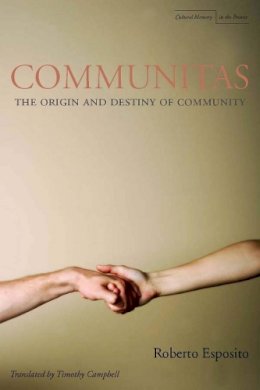6%OFF

Stock image for illustration purposes only - book cover, edition or condition may vary.
Communitas: The Origin and Destiny of Community
Roberto Esposito
€ 26.99
€ 25.25
FREE Delivery in Ireland
Description for Communitas: The Origin and Destiny of Community
Paperback. Roberto Esposito, a leading Italian philosopher, deconstructs the notion of community by examining its etymological roots in the Latin munus, or gift, and then reads against classical political interpretations of community. Translator(s): Campbell, Timothy C. Series: Cultural Memory in the Present. Num Pages: 192 pages. BIC Classification: HP. Category: (P) Professional & Vocational; (U) Tertiary Education (US: College). Dimension: 5817 x 3887 x 15. Weight in Grams: 295.
No theme has been more central to international philosophical debates than that of community: from American communitarianism to Habermas's ethic of communication to the French deconstruction of community in the work of Derrida and Nancy. Nevertheless, in none of these cases has the concept been examined from the perspective of community's original etymological meaning: cum munus. In Communitas: The Origin and Destiny of Community, Roberto Esposito does just that through an original counter-history of political philosophy that takes up not only readings of community by Hobbes, Rousseau, Kant, Heidegger and Bataille, but also by Hölderlin, Nietzsche, Canetti, Arendt, and Sartre. ... Read more
Show LessProduct Details
Publisher
Stanford University Press United States
Number of pages
208
Format
Paperback
Publication date
2009
Series
Cultural Memory in the Present
Condition
New
Weight
295g
Number of Pages
192
Place of Publication
Palo Alto, United States
ISBN
9780804746472
SKU
V9780804746472
Shipping Time
Usually ships in 7 to 11 working days
Ref
99-1
About Roberto Esposito
Roberto Esposito teaches contemporary philosophy at the Italian Institute for the Human Sciences in Naples. His Bíos: Biopolitics and Philosophy (2008) has also been translated into English.
Reviews for Communitas: The Origin and Destiny of Community
"Underlying [Esposito's] philosophical work is the idea that our political vocabulary is exhausted. Old political notions need not to be replaced by new ones, but through historical reflection it is important to trace what has remained unthought in those concepts . . . Esposito's reflections are most stimulating."—Walter Van Herck, Bijdragen, International Journal in Philosophy and Theology "Those—especially English-speaking readers—familiar ... Read more
